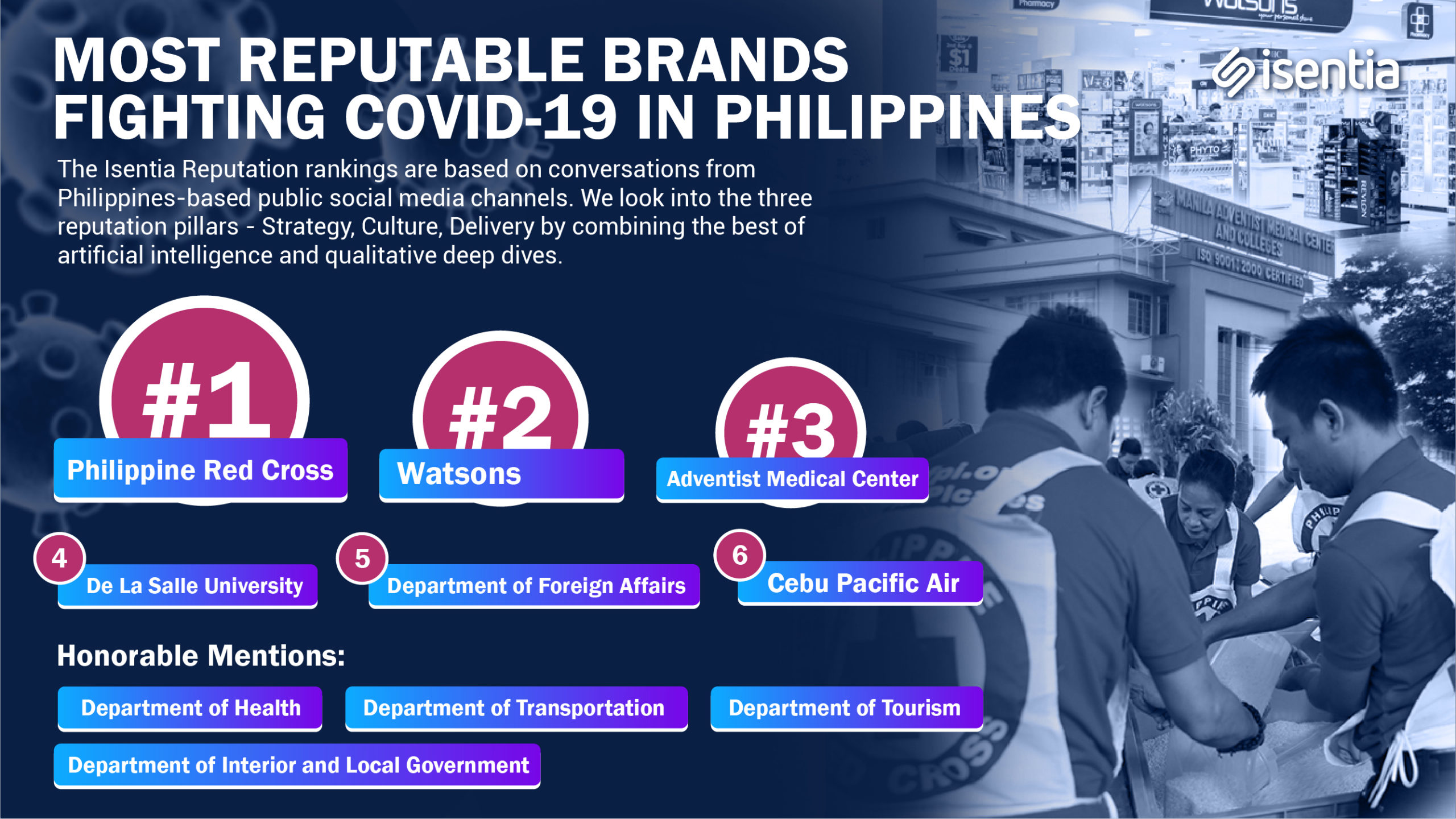
Accroding to a study by Asia Pacific media intelligence and insights company Isentia, the Philippine Red Cross (PRC), Watsons Philippines, and Adventist Medical Center Manila top the list of “Most Reputable Brands in the Philippines Fighting Against Covid-19.”
The reputation rankings report uncovers how the netizens in the Philippines perceive brands in terms of Isentia’s “reputation framework,” which has three pillars: Strategy (has good leadership and is an industry leader, innovative, expected to be successful in the next five years, is believed in by people); Culture (a good, honest, and ethical employer, which offers a good and diverse workplace where people are proud to be); and Delivery (Are you: good at what you do; top of mind in your sector; and financially successful? Do people like hearing from you, and do you care about quality?)The study, which also has local versions in Malaysia, Indonesia, Thailand, and Vietnam, assessed over 161,000 organic social media conversations across more than 9,000 platforms, including Facebook, Twitter, and online forums, says Lady Ochel Espinosa, insights and research director of Isentia Philippines. The study was conducted over a six-week period, from Jan. 1 to Feb. 15.
“Our reputation analysis uses an integrated framework that blends social media conversations, traditional media, and survey data in order to reveal a point in time, comprehensive view on what people say, think and feel about organizations. [But] for this study alone, we only viewed the social media space,” says Espinosa. “The reputation of a company is its overall character as judged by the people. Some companies are admired more than others for their immaculate reputation. In times of crisis, these companies often emerge at the top with their well-informed strategy, distinctive culture and reliable delivery.“
According to the report, PRC tops the list because of its strong communications strategy. Netizens appreciated how the organization kept the public informed of developments and updates on Covid-19, with news channels cascading information from the agency in reports shared on social media. Such communications from the agency were well-retweeted by netizens, whose goal was to spread information on the country’s Covid-19 situation.
Strategy is also what cemented Watsons Philippines’ good reputation among netizens. The brand leveraged well on its digital presence, and campaigned for preventive and precautionary measures against the spread of virus, particularly the availability of surgical masks as the country faced concerns on supply. According to the report, Watsons also received praise from the online community with regard to their response to another crisis: the Taal Volcano explosion.
As for the Adventist Medical Center Manila, delivery became their strongest suit, besting other more well-known institutions as it readily addressed and clarified that there was no patient affected with COVID-19 admitted in their unit. It was also observed that the online community placed a high level of trust in the hospital’s reports.
Other hospitals, however, were given an honorable mention in the list: East Avenue Medical Center, Pasig General Hospital, Makati Medical Center, The Medical City, and Asian Hospital and Medical Center. These brands received good scores, says Espinosa, but did not make it to the Most Reputable list.
Government agencies such as the Department of Health (DOH), Department of Transportation (DOTr), Department of Interior and Local Government (DILG), and Department of Tourism (DOT) are also honorable mentions, as well as airline Air Asia.The list, in total, includes six brands. In fourth, fifth, and sixth place, respectively, are De La Salle University (DLSU), the Department of Foreign Affairs (DFA), and Cebu Pacific Air.
DLSU, like PRC and Watsons, made it because of its communications strategy, which kept people even outside its community well-informed on Covid-19 developments. The university’s safety measures—temperature checks, travel restrictions imposed on faculty and staff, and preparations on possible class suspensions—were highly appreciated by netizens.
Strategy, again, is what secured DFA a spot on the list, because of its efforts surrounding travel restrictions and repatriation of Filipino workers. As for Cebu Pacific, the brand scored high with netizens because of its “consistent delivery of messages and advisories through online and offline platforms.”
Outside of the Covid-19 outbreak, Isentia conducts such reputation study for their clients on a periodic basis, says Espinosa. However, “in the advent of a global crisis that has affected locations where Isentia offices are present, we have decided to use the same framework, particularly measuring reputation during a crisis. As an organization, we were prompted by the outbreak to find out how these organizations are performing outside of the regular course of business,” she adds.
And while intangible, reputation should be an important factor for any brand, business, or organization, since it is key to achieving “communication objectives among today’s connected digital public, who, in essence monitor everything and overlook nothing,” Espinosa says.
Prashant Saxena, Isentia’s head of insights for Asia, adds: “Brands are working closely with the government to fight the COVID-19 outbreak. Well-intended strategy, executed with the support of resilient company culture to deliver benefits to consumers goes a long way in improving the reputation of these brands.”